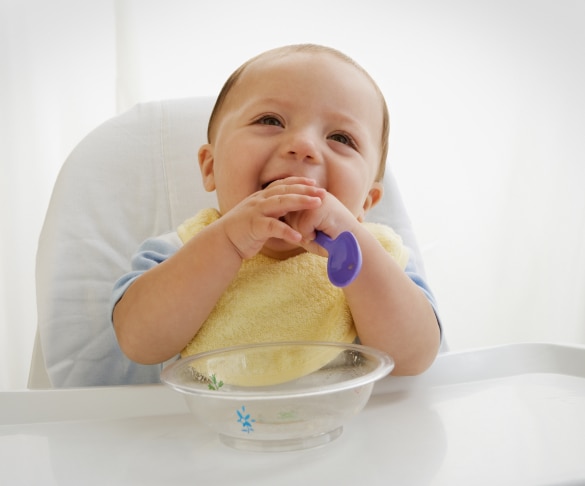What's in This Article
- Your baby cries or is fussy.
- They put their fingers or first in their mouth, or suck on their fingers.
- Your little one opens their mouth wide when touched on his chin or lips and roots for a nipple.
- They squirm or move their arms and legs.
- Your baby moves, licks or smacks his lips or makes small sounds.
These days, there are a lot of options when it comes to starting your baby on solid foods. Advice swirls around topics such as purees, baby-led feeding, utensils, timing, food allergens, and more. For first-time parents, all this advice might just make the whole milestone feel stressful and confusing.
So, if you’re stuck wondering where to start, don’t worry! Here’s a guide to help you navigate new feedings. A safe and convenient way to kickstart your little one’s first foray into solids is with spoon feeding. This method is great, because it helps babies develop eating skills while giving them time to adjust to new foods in their routine.


Spoon feeding is just what it sounds like: using a spoon to introduce solid foods to a baby who’s developmentally ready for them (sitting with support, interested in food, and usually around six months of age). With a spoon, you can introduce your baby to a variety of foods, from nutritious infant cereal to a rainbow of pureed fruits and veggies. This time-honored method supports the development of jaw movement and oral motor skills, and it can also introduce them to a variety of textures. And importantly, it helps get baby accustomed to chewing and swallowing, a process they’ll need to master before graduating to more advanced solid foods.
Want to give it a try? Here are the top tips for becoming a spoon-feeding superstar:
- Use a soft, rubber-tipped spoon and keep food cool (not cold) or warm (not hot).
- Guide the spoon to your child’s mouth with both your hand and theirs on the handle.
- Allow them to play with the spoon or another spoon of their own, including the handle. Over time, they should grow comfortable using the utensil, improving the fine-motor skills they’ll need to grasp other things, like crayons and toys.
If you want more tips on spoon feeding, there’s a full list here.
When paired with nutritious pureed blends and nutrient-dense infant cereals, spoon-feeding can help meet a baby’s nutritional needs and support eating development for your little one


No Matter the Method, Responsive Feeding Is Key
Responsive feeding is a part of all methods (and not just with babies—kids too, and even your own meals should utilize responsive feeding!). Instead of focusing on how much your baby eats, pay attention to their signals. When you offer your baby food, whether through finger-feeding or spoon-feeding, recognize and respond to their hunger and fullness cues in a timely manner. Don’t pressure or restrict how much they eat. While your baby can’t yet use words to tell you they’re hungry or full, there are signs to look for that will make anticipating their needs easier.
Signs of hunger:
- Crying or fussing
- Reaching for the spoon
- Opening the mouth
Signs of fullness:
- Turning away from the spoon
- Clenching the mouth shut
- Spitting out the food
You can learn more about those signs here.
Both spoon-feeding and baby-led feeding help your child build important skills as they transition to solid food. To help with both techniques, Gerber offers a full line of products to help ensure baby gets important nutrition for healthy growth and development – from iron fortified cereal, which can help provide iron, zinc and essential B vitamins, a wide variety of purees made from fruits, veggies, whole grains, legumes and meats to fortified snacks designed for older babies to self-feed. You can learn more about how Gerber purees its food right here.
It’s so normal to feel overwhelmed when your child begins an important transition like moving to solid foods. It’s a milestone just as much for parents as it is for babies. Everyone is learning together and finding the tools and routines that work best for them. However you decide to feed your baby, you can count on Gerber to provide the nutrition your little one needs—and the peace of mind you deserve.






